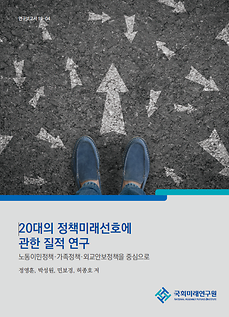
The National Assembly Futures Institute conducted the “Survey on Public Preference of Political Futures” online for 3,000 men and women aged between 15 and 65 from all over the country, from January 18 to 22, 2019. The results showed that those in their twenties had a preference for a conservative outlook and system in terms of foreign and security policies, local decentralization policies, and climate and energy policies, similar to those in their sixties. On the other hand, those in their twenties showed a more progressive tendency compared to other age groups when it came to the use of big data, policies on new types of living communities, policies for new types of social conflict, and assisted suicide.
This research focused on the three policy areas where those in their twenties showed distinctive preference stances, which are labor and immigration policies, family policies, and foreign and security policies. Using focused group interviews, the research team collected data to conduct an in-depth and systematic analysis on the background and reasons for such preferences by using the grounded theory approach. Based on the findings, the research deduced implications for establishing policies to prepare for changes in the future.
The results of the analysis showed that labor and immigration policies can cause the greatest social and political controversy in terms of the possible outlook for the future. It is difficult to break the “otherization” of migrant workers by those in their twenties, as it is based on the economic and social environment in which they find themselves. There should be policies to qualitatively and quantitatively control the influx of migrant workers, as well as social integration policies to minimize conflicts between Korean nationals and migrants, to improve the national level of acceptance for migrant workers.
Improving the national level of acceptance regarding immigrants will contribute to securing a more objective and balanced awareness when it comes to Korea taking a strategic stance on foreign and security policies. There will be a smaller range of choices in terms of diplomatic strategies for Korea between China and the United States if we feel closer to American culture and distinct from Chinese culture. It is extremely unfortunate in terms of creating peace in Northeastern Asia that those in their twenties have strong negative sentiments about the Chinese and Chinese culture. It is relatively less likely that family policies will cause conflict among the members of society than the other two types of policies.
Those in their fifties have a strong awareness about changes related to the family system, regardless of the values of family that they wish to keep. They are also aware of the fact that they cannot change the upcoming trend when it comes to family values. Although it is possible that the system of “family” will change in the future, the traditional and new views on family will coexist, and it is difficult to predict how long such conflicting views will coexist. What is important here is that there should be a neutral policy in terms of the types of family. This should start from accepting the fact that individuals should be free to change their types of family based on their own choices, without facing discrimination.